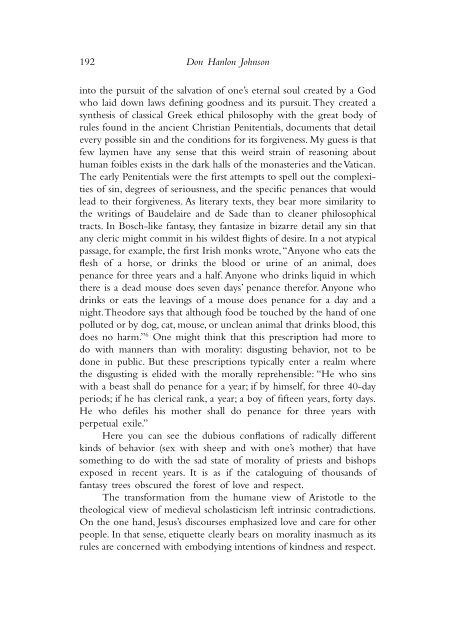Create successful ePaper yourself
Turn your PDF publications into a flip-book with our unique Google optimized e-Paper software.
192 Don Hanlon Johnson<br />
into <strong>the</strong> pursuit <strong>of</strong> <strong>the</strong> salvation <strong>of</strong> one’s eternal soul created by a God<br />
who laid down laws defining goodness and its pursuit. They created a<br />
syn<strong>the</strong>sis <strong>of</strong> classical Greek ethical philosophy with <strong>the</strong> great body <strong>of</strong><br />
rules found in <strong>the</strong> ancient Christian Penitentials, documents that detail<br />
every possible sin and <strong>the</strong> conditions for its forgiveness. My guess is that<br />
few laymen have any sense that this weird strain <strong>of</strong> reasoning about<br />
human foibles exists in <strong>the</strong> dark halls <strong>of</strong> <strong>the</strong> monasteries and <strong>the</strong> Vatican.<br />
The early Penitentials were <strong>the</strong> first attempts to spell out <strong>the</strong> complexities<br />
<strong>of</strong> sin, degrees <strong>of</strong> seriousness, and <strong>the</strong> specific penances that would<br />
lead to <strong>the</strong>ir forgiveness. As literary texts, <strong>the</strong>y bear more similarity to<br />
<strong>the</strong> writings <strong>of</strong> Baudelaire and de Sade than to cleaner philosophical<br />
tracts. In Bosch-like fantasy, <strong>the</strong>y fantasize in bizarre detail any sin that<br />
any cleric might commit in his wildest flights <strong>of</strong> desire. In a not atypical<br />
passage, for example, <strong>the</strong> first Irish monks wrote, “Anyone who eats <strong>the</strong><br />
flesh <strong>of</strong> a horse, or drinks <strong>the</strong> blood or urine <strong>of</strong> an animal, does<br />
penance for three years and a half. Anyone who drinks liquid in which<br />
<strong>the</strong>re is a dead mouse does seven days’ penance <strong>the</strong>refor. Anyone who<br />
drinks or eats <strong>the</strong> leavings <strong>of</strong> a mouse does penance for a day and a<br />
night. Theodore says that although food be touched by <strong>the</strong> hand <strong>of</strong> one<br />
polluted or by dog, cat, mouse, or unclean animal that drinks blood, this<br />
does no harm.” 6 One might think that this prescription had more to<br />
do with manners than with morality: disgusting behavior, not to be<br />
done in public. But <strong>the</strong>se prescriptions typically enter a realm where<br />
<strong>the</strong> disgusting is elided with <strong>the</strong> morally reprehensible: “He who sins<br />
with a beast shall do penance for a year; if by himself, for three 40-day<br />
periods; if he has clerical rank, a year; a boy <strong>of</strong> fifteen years, forty days.<br />
He who defiles his mo<strong>the</strong>r shall do penance for three years with<br />
perpetual exile.”<br />
Here you can see <strong>the</strong> dubious conflations <strong>of</strong> radically different<br />
kinds <strong>of</strong> behavior (sex with sheep and with one’s mo<strong>the</strong>r) that have<br />
something to do with <strong>the</strong> sad state <strong>of</strong> morality <strong>of</strong> priests and bishops<br />
exposed in recent years. It is as if <strong>the</strong> cataloguing <strong>of</strong> thousands <strong>of</strong><br />
fantasy trees obscured <strong>the</strong> forest <strong>of</strong> love and respect.<br />
The transformation from <strong>the</strong> humane view <strong>of</strong> Aristotle to <strong>the</strong><br />
<strong>the</strong>ological view <strong>of</strong> medieval scholasticism left intrinsic contradictions.<br />
On <strong>the</strong> one hand, Jesus’s discourses emphasized love and care for o<strong>the</strong>r<br />
people. In that sense, etiquette clearly bears on morality inasmuch as its<br />
rules are concerned with embodying intentions <strong>of</strong> kindness and respect.
















